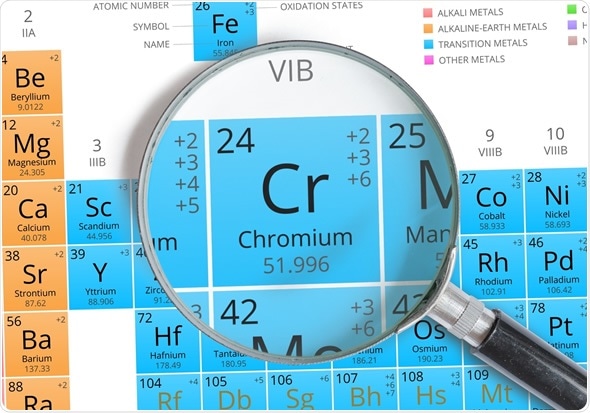Chromium (Cr) is among several essential trace elements. Chromium optimizes insulin function and can have a marked impact on the metabolism of carbohydrates, proteins, and lipids. However, there has been much debate, and the scientific evidence has been mixed, as to whether chromium supplementation can have a beneficial impact on controlling blood glucose levels, weight loss, or diabetes, among other conditions.

Controlling blood sugar
In type 2 diabetes, although the pancreas is producing enough insulin, good control of glucose levels becomes difficult. Type 2 diabetes sets in when tissue and muscle cells start to resist insulin. Researchers have investigated how chromium supplements impact people with type 2 diabetes.
Chromium does not have a major influence on the metabolism of lipids or glucose in non-diabetics. Scientists must undertake higher quality studies before any specific claims can be determined about how chromium impacts non-diabetics. Although chromium significantly improved glycemia among patients with diabetes, additional research is needed on this front as well.
Insulin receptor kinase
Chromium nutritionally can boost in vivo insulin activity, which optimizes tolerance to glucose. However, scientists did not know the mechanism involved. Investigators have learned that pretreating Chinese hamster ovary insulin receptor cells with chromium intensifies insulin receptor tyrosine phosphorylation.
The investigators used chromium-treated cells to prepare purified plasma membranes. These membranes retained greater levels of insulin-dependent kinase activity, compared to controls. It appears that cellular chromium increases insulin signaling by expanding insulin receptor kinase activity. Moreover, drug-based and nutritional treatments in combination could fight insulin resistance, an indicator of type 2 diabetes.
Weight control
For chromium, another area of scientific interest has focused on the element’s ability to control lipid metabolism and glucose levels. Then in turn, control weight and optimize the distribution of body fat and the amount of lean mass.
The compound chromium picolinate is often applied as a nutritional supplement. Scientists have examined how supplementing chromium picolinate could cut weight, change body makeup, and lower iron levels in females who continuously consumed nutrients and energy-based products. However it was determined that when the subject’s energy intake was controlled, chromium picolinate supplementation on its own did not affect weight, body mass, or iron levels. So, the belief that chromium supplementation facilitates the loss of weight and optimizes body makeup was not sustained.
Muscle gain
In a double-blind trial, encapsulated chromium supplements or a placebo were ingested by young men who underwent a managed exercise program for two months to improve their strength. There were no benefits for muscle or strength growth nor for loss of fat from the supplements, compared with those who did not consume chromium supplements. Investigators concluded that chromium did not improve body composition. They also indicated that only those with low levels of chromium may benefit from supplementation.
Blood pressure
Researchers have found that in rats with hypertension, chromium nicotinate administered by mouth lowered high blood pressure levels. They expanded their research to see if additional chromium compounds had an effect on blood pressure in hypertensive rats. In addition, they wanted to determine if chromium has antioxidant activity.
A control group of hypertensive rats was administered a low chromium diet, while five other clusters of rats consumed the same diet, but with additional (5 ppm) compounds of chromium – nicotinate, picolinate, acetate, chloride, and nicotinic acid-glycine-cysteine-glutamic acid. The rats then drank water that contained 5% and 10% sucrose. Based on results, the scientists determined that chromium can help optimize sucrose-induced hypertension and also has antioxidative properties.
Acute tubular necrosis
Scientists have connected chromium supplementation with the death of tubular epithelial cells that form the renal tubules found in kidneys. A male aged 24 years had consumed, during exercise sessions, a dietary supplement for two weeks and experienced acute kidney injury. X-rays revealed only a right functioning kidney. Acute tubular necrosis was determined by a biopsy.
Renal impairment set in, and the patient needed to undergo hemodialysis, and receive other therapies. He recovered and retained normal kidney function. The main components in the supplement consumed were chromium picolinate, Sida cordifolia, synephrine, and guarana. An objective assessment by the researchers indicated a connection between ingestion of the supplement and kidney failure.
Reviewed by: Angela Garland BEng
Sources
- www.eufic.org/…/
- http://www.ncbi.nlm.nih.gov/pubmed/17519436
- http://www.ncbi.nlm.nih.gov/pubmed/17291720
- http://europepmc.org/abstract/med/9181280
- www.ars.usda.gov/research/publications/publication/?seqNo115=63558
- www.ars.usda.gov/research/publications/publication/?seqNo115=147296
- http://www.ncbi.nlm.nih.gov/pubmed/16492795?dopt=Citation
- www.ncbi.nlm.nih.gov/pubmed
Further Reading
- All Chromium Content
- How Chromium Functions in the Body
Last Updated: Aug 23, 2018

Written by
Joseph Constance
Joseph Constance has written about research, development, and markets in the health care and related fields. He has authored a number of articles, and business analysis/market research reports in the medical device, clinical diagnostics, and pharmaceutical areas. Joseph holds an MA from New York University in Communications. He enjoys spending time with his wife, biking, traveling, and learning about different cultures.
Source: Read Full Article
